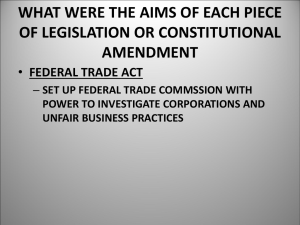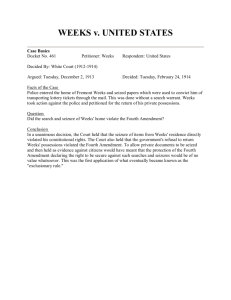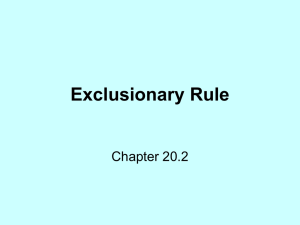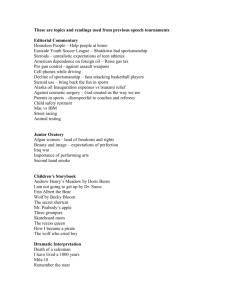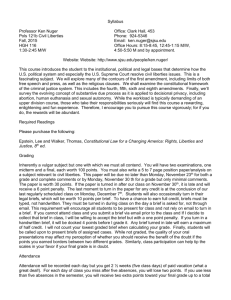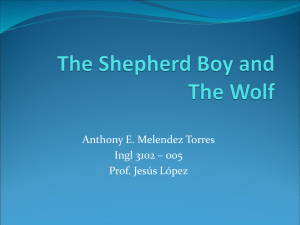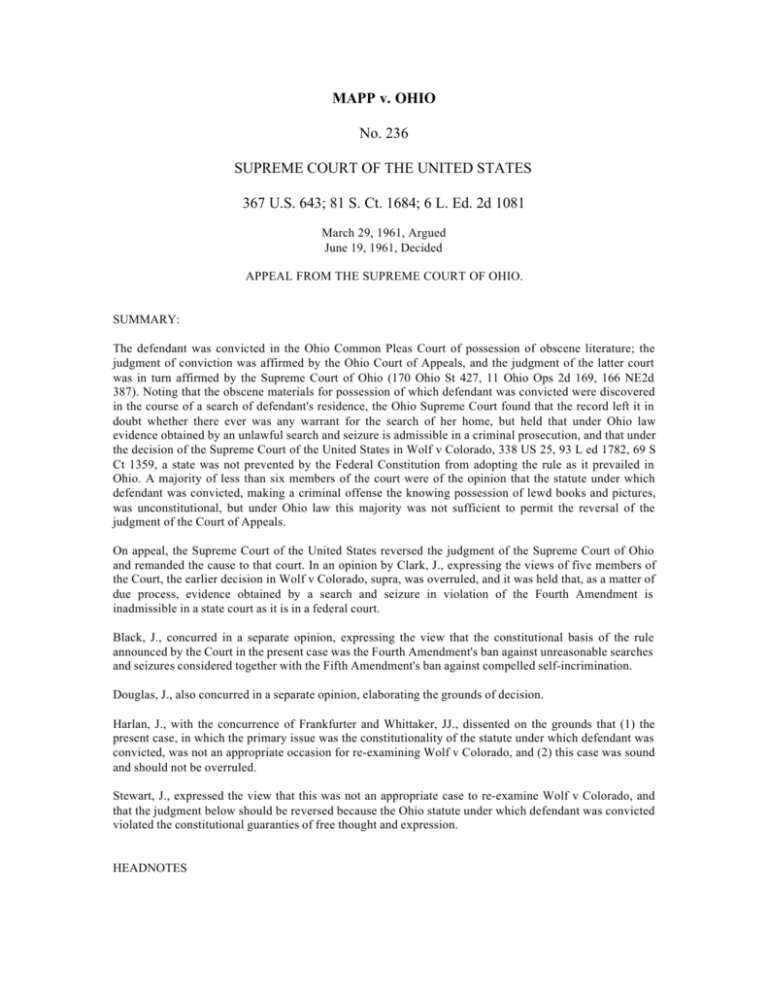
MAPP v. OHIO
No. 236
SUPREME COURT OF THE UNITED STATES
367 U.S. 643; 81 S. Ct. 1684; 6 L. Ed. 2d 1081
March 29, 1961, Argued
June 19, 1961, Decided
APPEAL FROM THE SUPREME COURT OF OHIO.
SUMMARY:
The defendant was convicted in the Ohio Common Pleas Court of possession of obscene literature; the
judgment of conviction was affirmed by the Ohio Court of Appeals, and the judgment of the latter court
was in turn affirmed by the Supreme Court of Ohio (170 Ohio St 427, 11 Ohio Ops 2d 169, 166 NE2d
387). Noting that the obscene materials for possession of which defendant was convicted were discovered
in the course of a search of defendant's residence, the Ohio Supreme Court found that the record left it in
doubt whether there ever was any warrant for the search of her home, but held that under Ohio law
evidence obtained by an unlawful search and seizure is admissible in a criminal prosecution, and that under
the decision of the Supreme Court of the United States in Wolf v Colorado, 338 US 25, 93 L ed 1782, 69 S
Ct 1359, a state was not prevented by the Federal Constitution from adopting the rule as it prevailed in
Ohio. A majority of less than six members of the court were of the opinion that the statute under which
defendant was convicted, making a criminal offense the knowing possession of lewd books and pictures,
was unconstitutional, but under Ohio law this majority was not sufficient to permit the reversal of the
judgment of the Court of Appeals.
On appeal, the Supreme Court of the United States reversed the judgment of the Supreme Court of Ohio
and remanded the cause to that court. In an opinion by Clark, J., expressing the views of five members of
the Court, the earlier decision in Wolf v Colorado, supra, was overruled, and it was held that, as a matter of
due process, evidence obtained by a search and seizure in violation of the Fourth Amendment is
inadmissible in a state court as it is in a federal court.
Black, J., concurred in a separate opinion, expressing the view that the constitutional basis of the rule
announced by the Court in the present case was the Fourth Amendment's ban against unreasonable searches
and seizures considered together with the Fifth Amendment's ban against compelled self-incrimination.
Douglas, J., also concurred in a separate opinion, elaborating the grounds of decision.
Harlan, J., with the concurrence of Frankfurter and Whittaker, JJ., dissented on the grounds that (1) the
present case, in which the primary issue was the constitutionality of the statute under which defendant was
convicted, was not an appropriate occasion for re-examining Wolf v Colorado, and (2) this case was sound
and should not be overruled.
Stewart, J., expressed the view that this was not an appropriate case to re-examine Wolf v Colorado, and
that the judgment below should be reversed because the Ohio statute under which defendant was convicted
violated the constitutional guaranties of free thought and expression.
HEADNOTES
[1] What is a reasonable search not prohibited by the Fourth Amendment is not to be determined by any
fixed formula.
[2] What is a reasonable search not prohibited by the Fourth Amendment is in the first instance for the trial
court to determine.
[3] All evidence obtained by searches and seizures in violation of the Fourth Amendment of the Federal
Constitution is, by virtue of the due process clause of the Fourteenth Amendment guaranteeing the right to
privacy free from unreasonable state intrusion, inadmissible in a state court.
[4] The Fourth Amendment's right of privacy is enforceable against the states through the due process
clause of the Fourteenth Amendment.
[5] As to the federal government, the Fourth and Fifth Amendments and, as to the states, the freedom from
unconscionable invasions of privacy and the freedom from convictions based upon coerced confessions
enjoy an intimate relation in their perpetuation of principles of humanity and civil liberty, and express
supplementing phases of the same constitutional purpose--to maintain inviolate large areas of personal
privacy; the philosophy of each amendment and of each freedom is complementary to, although not
dependent upon, that of the other in its sphere of influence--the very least that together they assure in either
sphere is that no man is to be convicted on unconstitutional evidence.
[6] The rule which excludes unconstitutional evidence from being admitted in a state criminal trial is an
essential part of both the Fourth and Fourteenth Amendments.
[7] The very essence of a healthy federalism depends upon the avoidance of needless conflict between
state and federal courts.
[8] However much in a particular case insistence upon observance by law officers of traditional fair
procedural requirements may appear as a technicality that inures to the benefit of a guilty person, the
history of the criminal law proves that tolerance of short-cut methods in law enforcement impairs its
enduring effectiveness.
[9] In determining whether a state conviction of crime is constitutionally impermissible because of the
admission at the trial of evidence unconstitutionally obtained, state procedural requirements governing
assertion and pursuance of direct and collateral constitutional challenges to criminal prosecutions must be
respected. Point from Separate Opinion
SYLLABUS:
All evidence obtained by searches and seizures in violation of the Federal Constitution is inadmissible in a
criminal trial in a state court. Wolf v. Colorado, 338 U.S. 25, overruled insofar as it holds to the contrary.
Pp. 643-660.
170 Ohio St. 427, 166 N. E. 2d 387, reversed.
A. L. Kearns argued the cause for appellant. With him on the brief was Walter L. Greene.
Gertrude Bauer Mahon argued the cause for appellee. With her on the brief was John T. Corrigan.
Bernard A. Berkman argued the cause for the American Civil Liberties Union et al., as amici curiae, urging
reversal. With him on the brief was Rowland Watts.
MR. JUSTICE CLARK delivered the opinion of the Court.
Appellant stands convicted of knowingly having had in her possession and under her control certain lewd
and lascivious books, pictures, and photographs in violation of § 2905.34 of Ohio's Revised Code. n1 As
officially stated in the syllabus to its opinion, the Supreme Court of Ohio found that her conviction was
valid though "based primarily upon the introduction in evidence of lewd and lascivious books and pictures
unlawfully seized during an unlawful search of defendant's home . . . ." 170 Ohio St. 427-428, 166 N. E. 2d
387, 388.
On May 23, 1957, three Cleveland police officers arrived at appellant's residence in that city pursuant to
information that "a person [was] hiding out in the home, who was wanted for questioning in connection
with a recent bombing, and that there was a large amount of policy paraphernalia being hidden in the
home." Miss Mapp and her daughter by a former marriage lived on the top floor of the two-family
dwelling. Upon their arrival at that house, the officers knocked on the door and demanded entrance but
appellant, after telephoning her attorney, refused to admit them without a search warrant. They advised
their headquarters of the situation and undertook a surveillance of the house.
The officers again sought entrance some three hours later when four or more additional officers arrived on
the scene. When Miss Mapp did not come to the door immediately, at least one of the several doors to the
house was forcibly opened n2 and the policemen gained admittance. Meanwhile Miss Mapp's attorney
arrived, but the officers, having secured their own entry, and continuing in their defiance of the law, would
permit him neither to see Miss Mapp nor to enter the house. It appears that Miss Mapp was halfway down
the stairs from the upper floor to the front door when the officers, in this highhanded manner, broke into the
hall. She demanded to see the search warrant. A paper, claimed to be a warrant, was held up by one of the
officers. She grabbed the "warrant" and placed it in her bosom. A struggle ensued in which the officers
recovered the piece of paper and as a result of which they handcuffed appellant because she had been
"belligerent" in resisting their official rescue of the "warrant" from her person. Running roughshod over
appellant, a policeman "grabbed" her, "twisted [her] hand," and she "yelled [and] pleaded with him"
because "it was hurting." Appellant, in handcuffs, was then forcibly taken upstairs to her bedroom where
the officers searched a dresser, a chest of drawers, a closet and some suitcases. They also looked into a
photo album and through personal papers belonging to the appellant. The search spread to the rest of the
second floor including the child's bedroom, the living room, the kitchen and a dinette. The basement of the
building and a trunk found therein were also searched. The obscene materials for possession of which she
was ultimately convicted were discovered in the course of that widespread search.
At the trial no search warrant was produced by the prosecution, nor was the failure to produce one
explained or accounted for. At best, "There is, in the record, considerable doubt as to whether there ever
was any warrant for the search of defendant's home." 170 Ohio St., at 430, 166 N. E. 2d, at 389. The Ohio
Supreme Court believed a "reasonable argument" could be made that the conviction should be reversed
"because the 'methods' employed to obtain the [evidence] . . . were such as to 'offend "a sense of justice,"'"
but the court found determinative the fact that the evidence had not been taken "from defendant's person by
the use of brutal or offensive physical force against defendant." 170 Ohio St., at 431, 166 N. E. 2d, at 389390.
The State says that even if the search were made without authority, or otherwise unreasonably, it is not
prevented from using the unconstitutionally seized evidence at trial, citing Wolf v. Colorado, 338 U.S. 25
(1949), in which this Court did indeed hold "that in a prosecution in a State court for a State crime the
Fourteenth Amendment does not forbid the admission of evidence obtained by an unreasonable search and
seizure." At p. 33. On this appeal, of which we have noted probable jurisdiction, 364 U.S. 868, it is urged
once again that we review that holding. n3
I.
Seventy-five years ago, in Boyd v. United States, 116 U.S. 616, 630 (1886), considering the Fourth n4 and
Fifth Amendments as running "almost into each other" n5 on the facts before it, this Court held that the
doctrines of those Amendments
"apply to all invasions on the part of the government and its employes of the sanctity of a man's home and
the privacies of life. It is not the breaking of his doors, and the rummaging of his drawers, that constitutes
the essence of the offence; but it is the invasion of his indefeasible right of personal security, personal
liberty and private property . . . . Breaking into a house and opening boxes and drawers are circumstances
of aggravation; but any forcible and compulsory extortion of a man's own testimony or of his private papers
to be used as evidence to convict him of crime or to forfeit his goods, is within the condemnation . . . [of
those Amendments]."
The Court noted that
"constitutional provisions for the security of person and property should be liberally construed. . . . It is the
duty of courts to be watchful for the constitutional rights of the citizen, and against any stealthy
encroachments thereon." At p. 635.
In this jealous regard for maintaining the integrity of individual rights, the Court gave life to Madison's
prediction that "independent tribunals of justice . . . will be naturally led to resist every encroachment upon
rights expressly stipulated for in the Constitution by the declaration of rights." I Annals of Cong. 439
(1789). Concluding, the Court specifically referred to the use of the evidence there seized as
"unconstitutional." At p. 638.
Less than 30 years after Boyd, this Court, in Weeks v. United States, 232 U.S. 383 (1914), stated that
"the Fourth Amendment . . . put the courts of the United States and Federal officials, in the exercise of their
power and authority, under limitations and restraints [and] . . . forever secure[d] the people, their persons,
houses, papers and effects against all unreasonable searches and seizures under the guise of law . . . and the
duty of giving to it force and effect is obligatory upon all entrusted under our Federal system with the
enforcement of the laws." At pp. 391-392.
Specifically dealing with the use of the evidence unconstitutionally seized, the Court concluded:
"If letters and private documents can thus be seized and held and used in evidence against a citizen accused
of an offense, the protection of the Fourth Amendment declaring his right to be secure against such
searches and seizures is of no value, and, so far as those thus placed are concerned, might as well be
stricken from the Constitution. The efforts of the courts and their officials to bring the guilty to punishment,
praiseworthy as they are, are not to be aided by the sacrifice of those great principles established by years
of endeavor and suffering which have resulted in their embodiment in the fundamental law of the land." At
p. 393.
Finally, the Court in that case clearly stated that use of the seized evidence involved "a denial of the
constitutional rights of the accused." At p. 398. Thus, in the year 1914, in the Weeks case, this Court "for
the first time" held that "in a federal prosecution the Fourth Amendment barred the use of evidence secured
through an illegal search and seizure." Wolf v. Colorado, supra, at 28. This Court has ever since required of
federal law officers a strict adherence to that command which this Court has held to be a clear, specific, and
constitutionally required -- even if judicially implied -- deterrent safeguard without insistence upon which
the Fourth Amendment would have been reduced to "a form of words." Holmes, J., Silverthorne Lumber
Co. v. United States, 251 U.S. 385, 392 (1920). It meant, quite simply, that "conviction by means of
unlawful seizures and enforced confessions . . . should find no sanction in the judgments of the courts . . . ,"
Weeks v. United States, supra, at 392, and that such evidence "shall not be used at all." Silverthorne
Lumber Co. v. United States, supra, at 392.
There are in the cases of this Court some passing references to the Weeks rule as being one of evidence.
But the plain and unequivocal language of Weeks -- and its later paraphrase in Wolf -- to the effect that the
Weeks rule is of constitutional origin, remains entirely undisturbed. In Byars v. United States, 273 U.S. 28
(1927), a unanimous Court declared that "the doctrine [cannot] . . . be tolerated under our constitutional
system, that evidences of crime discovered by a federal officer in making a search without lawful warrant
may be used against the victim of the unlawful search where a timely challenge has been interposed." At
pp. 29-30 (emphasis added). The Court, in Olmstead v. United States, 277 U.S. 438 (1928), in
unmistakable language restated the Weeks rule:
"The striking outcome of the Weeks case and those which followed it was the sweeping declaration that the
Fourth Amendment, although not referring to or limiting the use of evidence in courts, really forbade its
introduction if obtained by government officers through a violation of the Amendment." At p. 462.
In McNabb v. United States, 318 U.S. 332 (1943), we note this statement:
"[A] conviction in the federal courts, the foundation of which is evidence obtained in disregard of liberties
deemed fundamental by the Constitution, cannot stand. Boyd v. United States . . . Weeks v. United States . .
. . And this Court has, on Constitutional grounds, set aside convictions, both in the federal and state courts,
which were based upon confessions 'secured by protracted and repeated questioning of ignorant and
untutored persons, in whose minds the power of officers was greatly magnified' . . . or 'who have been
unlawfully held incommunicado without advice of friends or counsel' . . . ." At pp. 339-340.
Significantly, in McNabb, the Court did then pass on to formulate a rule of evidence, saying, "in the view
we take of the case, however, it becomes unnecessary to reach the Constitutional issue [for] . . . the
principles governing the admissibility of evidence in federal criminal trials have not been restricted . . . to
those derived solely from the Constitution." At pp. 340-341.
II.
In 1949, 35 years after Weeks was announced, this Court, in Wolf v. Colorado, supra, again for the first
time, n6 discussed the effect of the Fourth Amendment upon the States through the operation of the Due
Process Clause of the Fourteenth Amendment. It said:
"We have no hesitation in saying that were a State affirmatively to sanction such police incursion into
privacy it would run counter to the guaranty of the Fourteenth Amendment." At p. 28.
Nevertheless, after declaring that the "security of one's privacy against arbitrary intrusion by the police" is
"implicit in 'the concept of ordered liberty' and as such enforceable against the States through the Due
Process Clause," cf. Palko v. Connecticut, 302 U.S. 319 (1937), and announcing that it "stoutly adhere[d]"
to the Weeks decision, the Court decided that the Weeks exclusionary rule would not then be imposed upon
the States as "an essential ingredient of the right." 338 U.S., at 27-29. The Court's reasons for not
considering essential to the right to privacy, as a curb imposed upon the States by the Due Process Clause,
that which decades before had been posited as part and parcel of the Fourth Amendment's limitation upon
federal encroachment of individual privacy, were bottomed on factual considerations.
While they are not basically relevant to a decision that the exclusionary rule is an essential ingredient of the
Fourth Amendment as the right it embodies is vouchsafed against the States by the Due Process Clause, we
will consider the current validity of the factual grounds upon which Wolf was based.
The Court in Wolf first stated that "the contrariety of views of the States" on the adoption of the
exclusionary rule of Weeks was "particularly impressive" (at p. 29); and, in this connection, that it could
not "brush aside the experience of States which deem the incidence of such conduct by the police too slight
to call for a deterrent remedy . . . by overriding the [States'] relevant rules of evidence." At pp. 31-32.
While in 1949, prior to the Wolf case, almost two-thirds of the States were opposed to the use of the
exclusionary rule, now, despite the Wolf case, more than half of those since passing upon it, by their own
legislative or judicial decision, have wholly or partly adopted or adhered to the Weeks rule. See Elkins v.
United States, 364 U.S. 206, Appendix, pp. 224-232 (1960). Significantly, among those now following the
rule is California, which, according to its highest court, was "compelled to reach that conclusion because
other remedies have completely failed to secure compliance with the constitutional provisions . . . ." People
v. Cahan, 44 Cal. 2d 434, 445, 282 P. 2d 905, 911 (1955). In connection with this California case, we note
that the second basis elaborated in Wolf in support of its failure to enforce the exclusionary doctrine against
the States was that "other means of protection" have been afforded " the right to privacy." n7 338 U.S., at
30. The experience of California that such other remedies have been worthless and futile is buttressed by
the experience of other States. The obvious futility of relegating the Fourth Amendment to the protection of
other remedies has, moreover, been recognized by this Court since Wolf. See Irvine v. California, 347 U.S.
128, 137 (1954).
Likewise, time has set its face against what Wolf called the "weighty testimony" of People v. Defore, 242
N. Y. 13, 150 N. E. 585 (1926). There Justice (then Judge) Cardozo, rejecting adoption of the Weeks
exclusionary rule in New York, had said that "the Federal rule as it stands is either too strict or too lax."
242 N. Y., at 22, 150 N. E., at 588. However, the force of that reasoning has been largely vitiated by later
decisions of this Court. These include the recent discarding of the "silver platter" doctrine which allowed
federal judicial use of evidence seized in violation of the Constitution by state agents, Elkins v. United
States, supra; the relaxation of the formerly strict requirements as to standing to challenge the use of
evidence thus seized, so that now the procedure of exclusion, "ultimately referable to constitutional
safeguards," is available to anyone even "legitimately on [the] premises" unlawfully searched, Jones v.
United States, 362 U.S. 257, 266-267 (1960); and, finally, the formulation of a method to prevent state use
of evidence unconstitutionally seized by federal agents, Rea v. United States, 350 U.S. 214 (1956). Because
there can be no fixed formula, we are admittedly met with "recurring questions of the reasonableness of
searches," but less is not to be expected when dealing with a Constitution, and, at any rate, "reasonableness
is in the first instance for the [trial court] . . . to determine." United States v. Rabinowitz, 339 U.S. 56, 63
(1950).
It, therefore, plainly appears that the factual considerations supporting the failure of the Wolf Court to
include the Weeks exclusionary rule when it recognized the enforceability of the right to privacy against
the States in 1949, while not basically relevant to the constitutional consideration, could not, in any
analysis, now be deemed controlling.
III.
Some five years after Wolf, in answer to a plea made here Term after Term that we overturn its doctrine on
applicability of the Weeks exclusionary rule, this Court indicated that such should not be done until the
States had "adequate opportunity to adopt or reject the [Weeks] rule." Irvine v. California, supra, at 134.
There again it was said:
"Never until June of 1949 did this Court hold the basic search-and-seizure prohibition in any way
applicable to the states under the Fourteenth Amendment." Ibid.
And only last Term, after again carefully re-examining the Wolf doctrine in Elkins v. United States, supra,
the Court pointed out that "the controlling principles" as to search and seizure and the problem of
admissibility "seemed clear" (at p. 212) until the announcement in Wolf "that the Due Process Clause of the
Fourteenth Amendment does not itself require state courts to adopt the exclusionary rule" of the Weeks
case. At p. 213. At the same time, the Court pointed out, "the underlying constitutional doctrine which
Wolf established . . . that the Federal Constitution . . . prohibits unreasonable searches and seizures by state
officers" had undermined the "foundation upon which the admissibility of stateseized evidence in a federal
trial originally rested . . . ." Ibid. The Court concluded that it was therefore obliged to hold, although it
chose the narrower ground on which to do so, that all evidence obtained by an unconstitutional search and
seizure was inadmissible in a federal court regardless of its source. Today we once again examine Wolf's
constitutional documentation of the right to privacy free from unreasonable state intrusion, and, after its
dozen years on our books, are led by it to close the only courtroom door remaining open to evidence
secured by official lawlessness in flagrant abuse of that basic right, reserved to all persons as a specific
guarantee against that very same unlawful conduct. We hold that all evidence obtained by searches and
seizures in violation of the Constitution is, by that same authority, inadmissible in a state court.
IV.
Since the Fourth Amendment's right of privacy has been declared enforceable against the States through the
Due Process Clause of the Fourteenth, it is enforceable against them by the same sanction of exclusion as is
used against the Federal Government. Were it otherwise, then just as without the Weeks rule the assurance
against unreasonable federal searches and seizures would be "a form of words," valueless and undeserving
of mention in a perpetual charter of inestimable human liberties, so too, without that rule the freedom from
state invasions of privacy would be so ephemeral and so neatly severed from its conceptual nexus with the
freedom from all brutish means of coercing evidence as not to merit this Court's high regard as a freedom
"implicit in the concept of ordered liberty." At the time that the Court held in Wolf that the Amendment
was applicable to the States through the Due Process Clause, the cases of this Court, as we have seen, had
steadfastly held that as to federal officers the Fourth Amendment included the exclusion of the evidence
seized in violation of its provisions. Even Wolf "stoutly adhered" to that proposition. The right to privacy,
when conceded operatively enforceable against the States, was not susceptible of destruction by avulsion of
the sanction upon which its protection and enjoyment had always been deemed dependent under the Boyd,
Weeks and Silverthorne cases. Therefore, in extending the substantive protections of due process to all
constitutionally unreasonable searches -- state or federal -- it was logically and constitutionally necessary
that the exclusion doctrine -- an essential part of the right to privacy -- be also insisted upon as an essential
ingredient of the right newly recognized by the Wolf case. In short, the admission of the new constitutional
right by Wolf could not consistently tolerate denial of its most important constitutional privilege, namely,
the exclusion of the evidence which an accused had been forced to give by reason of the unlawful seizure.
To hold otherwise is to grant the right but in reality to withhold its privilege and enjoyment. Only last year
the Court itself recognized that the purpose of the exclusionary rule "is to deter -- to compel respect for the
constitutional guaranty in the only effectively available way -- by removing the incentive to disregard it."
Elkins v. United States, supra, at 217.
Indeed, we are aware of no restraint, similar to that rejected today, conditioning the enforcement of any
other basic constitutional right. The right to privacy, no less important than any other right carefully and
particularly reserved to the people, would stand in marked contrast to all other rights declared as "basic to a
free society." Wolf v. Colorado, supra, at 27. This Court has not hesitated to enforce as strictly against the
States as it does against the Federal Government the rights of free speech and of a free press, the rights to
notice and to a fair, public trial, including, as it does, the right not to be convicted by use of a coerced
confession, however logically relevant it be, and without regard to its reliability. Rogers v. Richmond, 365
U.S. 534 (1961). And nothing could be more certain than that when a coerced confession is involved, "the
relevant rules of evidence" are overridden without regard to "the incidence of such conduct by the police,"
slight or frequent. Why should not the same rule apply to what is tantamount to coerced testimony by way
of unconstitutional seizure of goods, papers, effects, documents, etc.? We find that, as to the Federal
Government, the Fourth and Fifth Amendments and, as to the States, the freedom from unconscionable
invasions of privacy and the freedom from convictions based upon coerced confessions do enjoy an
"intimate relation" n8 in their perpetuation of "principles of humanity and civil liberty [secured] . . . only
after years of struggle," Bram v. United States, 168 U.S. 532, 543-544 (1897). They express
"supplementing phases of the same constitutional purpose -- to maintain inviolate large areas of personal
privacy." Feldman v. United States, 322 U.S. 487, 489-490 (1944). The philosophy of each Amendment
and of each freedom is complementary to, although not dependent upon, that of the other in its sphere of
influence -- the very least that together they assure in either sphere is that no man is to be convicted on
unconstitutional evidence. Cf. Rochin v. California, 342 U.S. 165, 173 (1952).
V.
Moreover, our holding that the exclusionary rule is an essential part of both the Fourth and Fourteenth
Amendments is not only the logical dictate of prior cases, but it also makes very good sense. There is no
war between the Constitution and common sense. Presently, a federal prosecutor may make no use of
evidence illegally seized, but a State's attorney across the street may, although he supposedly is operating
under the enforceable prohibitions of the same Amendment. Thus the State, by admitting evidence
unlawfully seized, serves to encourage disobedience to the Federal Constitution which it is bound to
uphold. Moreover, as was said in Elkins, "the very essence of a healthy federalism depends upon the
avoidance of needless conflict between state and federal courts." 364 U.S., at 221. Such a conflict, hereafter
needless, arose this very Term, in Wilson v. Schnettler, 365 U.S. 381 (1961), in which, and in spite of the
promise made by Rea, we gave full recognition to our practice in this regard by refusing to restrain a
federal officer from testifying in a state court as to evidence unconstitutionally seized by him in the
performance of his duties. Yet the double standard recognized until today hardly put such a thesis into
practice. In nonexclusionary States, federal officers, being human, were by it invited to and did, as our
cases indicate, step across the street to the State's attorney with their unconstitutionally seized evidence.
Prosecution on the basis of that evidence was then had in a state court in utter disregard of the enforceable
Fourth Amendment. If the fruits of an unconstitutional search had been inadmissible in both state and
federal courts, this inducement to evasion would have been sooner eliminated. There would be no need to
reconcile such cases as Rea and Schnettler, each pointing up the hazardous uncertainties of our heretofore
ambivalent approach.
Federal-state cooperation in the solution of crime under constitutional standards will be promoted, if only
by recognition of their now mutual obligation to respect the same fundamental criteria in their approaches.
"However much in a particular case insistence upon such rules may appear as a technicality that inures to
the benefit of a guilty person, the history of the criminal law proves that tolerance of shortcut methods in
law enforcement impairs its enduring effectiveness." Miller v. United States, 357 U.S. 301, 313 (1958).
Denying shortcuts to only one of two cooperating law enforcement agencies tends naturally to breed
legitimate suspicion of "working arrangements" whose results are equally tainted. Byars v. United States,
273 U.S. 28 (1927); Lustig v. United States, 338 U.S. 74 (1949).
There are those who say, as did Justice (then Judge) Cardozo, that under our constitutional exclusionary
doctrine "the criminal is to go free because the constable has blundered." People v. Defore, 242 N. Y., at
21, 150 N. E., at 587. In some cases this will undoubtedly be the result. n9 But, as was said in Elkins, "there
is another consideration -- the imperative of judicial integrity." 364 U.S., at 222. The criminal goes free, if
he must, but it is the law that sets him free. Nothing can destroy a government more quickly than its failure
to observe its own laws, or worse, its disregard of the charter of its own existence. As Mr. Justice Brandeis,
dissenting, said in Olmstead v. United States, 277 U.S. 438, 485 (1928): "Our Government is the potent, the
omnipresent teacher. For good or for ill, it teaches the whole people by its example. . . . If the Government
becomes a lawbreaker, it breeds contempt for law; it invites every man to become a law unto himself; it
invites anarchy." Nor can it lightly be assumed that, as a practical matter, adoption of the exclusionary rule
fetters law enforcement. Only last year this Court expressly considered that contention and found that
"pragmatic evidence of a sort" to the contrary was not wanting. Elkins v. United States, supra, at 218. The
Court noted that
"The federal courts themselves have operated under the exclusionary rule of Weeks for almost half a
century; yet it has not been suggested either that the Federal Bureau of Investigation n10 has thereby been
rendered ineffective, or that the administration of criminal justice in the federal courts has thereby been
disrupted. Moreover, the experience of the states is impressive. . . . The movement towards the rule of
exclusion has been halting but seemingly inexorable." Id., at 218-219.
The ignoble shortcut to conviction left open to the State tends to destroy the entire system of constitutional
restraints on which the liberties of the people rest. n11 Having once recognized that the right to privacy
embodied in the Fourth Amendment is enforceable against the States, and that the right to be secure against
rude invasions of privacy by state officers is, therefore, constitutional in origin, we can no longer permit
that right to remain an empty promise. Because it is enforceable in the same manner and to like effect as
other basic rights secured by the Due Process Clause, we can no longer permit it to be revocable at the
whim of any police officer who, in the name of law enforcement itself, chooses to suspend its enjoyment.
Our decision, founded on reason and truth, gives to the individual no more than that which the Constitution
guarantees him, to the police officer no less than that to which honest law enforcement is entitled, and, to
the courts, that judicial integrity so necessary in the true administration of justice.
The judgment of the Supreme Court of Ohio is reversed and the cause remanded for further proceedings not
inconsistent with this opinion.
Reversed and remanded.
FOOTNOTES
n1 The statute provides in pertinent part that
"No person shall knowingly . . . have in his possession or under his control an obscene, lewd, or lascivious
book [or] . . . picture . . . .
"Whoever violates this section shall be fined not less than two hundred nor more than two thousand dollars
or imprisoned not less than one nor more than seven years, or both."
n2 A police officer testified that "we did pry the screen door to gain entrance"; the attorney on the scene
testified that a policeman "tried . . . to kick in the door" and then "broke the glass in the door and somebody
reached in and opened the door and let them in"; the appellant testified that "The back door was broken."
n3 Other issues have been raised on this appeal but, in the view we have taken of the case, they need not be
decided. Although appellant chose to urge what may have appeared to be the surer ground for favorable
disposition and did not insist that Wolf be overruled, the amicus curiae, who was also permitted to
participate in the oral argument, did urge the Court to overrule Wolf.
n4 "The right of the people to be secure in their persons, houses, papers, and effects, against unreasonable
searches and seizures, shall not be violated, and no Warrants shall issue, but upon probable cause,
supported by Oath or affirmation, and particularly describing the place to be searched, and the persons or
things to be seized."
n5 The close connection between the concepts later embodied in these two Amendments had been noted at
least as early as 1765 by Lord Camden, on whose opinion in Entick v. Carrington, 19 Howell's State Trials
1029, the Boyd court drew heavily. Lord Camden had noted, at 1073:
"It is very certain, that the law obligeth no man to accuse himself; because the necessary means of
compelling self-accusation, falling upon the innocent as well as the guilty, would be both cruel and unjust;
and it should seem, that search for evidence is disallowed upon the same principle. There too the innocent
would be confounded with the guilty."
n6 See, however, National Safe Deposit Co. v. Stead, 232 U.S. 58 (1914), and Adams v. New York, 192
U.S. 585 (1904).
n7 Less than half of the States have any criminal provisions relating directly to unreasonable searches and
seizures. The punitive sanctions of the 23 States attempting to control such invasions of the right of privacy
may be classified as follows:
Criminal Liability of Affiant for Malicious Procurement of Search Warrant. -- Ala. Code, 1958, Tit. 15, §
99; Alaska Comp. Laws Ann., 1949, § 66-7-15; Ariz. Rev. Stat. Ann., 1956, § 13-1454; Cal. Pen. Code §
170; Fla. Stat., 1959, § 933.16; Ga. Code Ann., 1953, § 27-301; Idaho Code Ann., 1948, § 18-709; Iowa
Code Ann., 1950, § 751.38; Minn. Stat. Ann., 1947, § 613.54; Mont. Rev. Codes Ann., 1947, § 94-35-122;
Nev. Rev. Stat. §§ 199.130, 199.140; N. J. Stat. Ann., 1940, § 33:1-64; N. Y. Pen. Law § 1786, N. Y. Code
Crim. Proc. § 811; N. C. Gen. Stat., 1953, § 15-27 (applies to "officers" only); N. D. Century Code Ann.,
1960, §§ 12-17-08, 29-29-18; Okla. Stat., 1951, Tit. 21, § 585, Tit. 22, § 1239; Ore. Rev. Stat. § 141.990;
S. D. Code, 1939 (Supp. 1960), § 34.9904; Utah Code Ann., 1953, § 77-54-21.
Criminal Liability of Magistrate Issuing Warrant Without Supporting Affidavit. -- N. C. Gen. Stat., 1953, §
15-27; Va. Code Ann., 1960 Replacement Volume, § 19.1-89.
Criminal Liability of Officer Willfully Exceeding Authority of Search Warrant. -- Fla. Stat. Ann., 1944, §
933.17; Iowa Code Ann., 1950, § 751.39; Minn. Stat. Ann., 1947, § 613.54; Nev. Rev. Stat. § 199.450; N.
Y. Pen. Law § 1847, N. Y. Code Crim. Proc. § 812; N. D. Century Code Ann., 1960, §§ 12-17-07, 29-29-
19; Okla. Stat., 1951, Tit. 21, § 536, Tit. 22, § 1240; S. D. Code, 1939 (Supp. 1960), § 34.9905; Tenn. Code
Ann., 1955, § 40-510; Utah Code Ann., 1953, § 77-54-22.
Criminal Liability of Officer for Search with Invalid Warrant or no Warrant. -- Idaho Code Ann., 1948, §
18-703; Minn. Stat. Ann., 1947, §§ 613.53, 621.17; Mo. Ann. Stat., 1953, § 558.190; Mont. Rev. Codes
Ann., 1947, § 94-3506; N. J. Stat. Ann., 1940, § 33:1-65; N. Y. Pen. Law § 1846; N. D. Century Code
Ann., 1960, § 12-17-06; Okla. Stat. Ann., 1958, Tit. 21, § 535; Utah Code Ann., 1953, § 76-28-52; Va.
Code Ann., 1960 Replacement Volume, § 19.1-88; Wash. Rev. Code §§ 10.79.040, 10.79.045.
n8 But compare Waley v. Johnston, 316 U.S. 101, 104, and Chambers v. Florida, 309 U.S. 227, 236, with
Weeks v. United States, 232 U.S. 383, and Wolf v. Colorado, 338 U.S. 25.
n9 As is always the case, however, state procedural requirements governing assertion and pursuance of
direct and collateral constitutional challenges to criminal prosecutions must be respected. We note,
moreover, that the class of state convictions possibly affected by this decision is of relatively narrow
compass when compared with Burns v. Ohio, 360 U.S. 252, Griffin v. Illinois, 351 U.S. 12, and Herman v.
Claudy, 350 U.S. 116. In those cases the same contention was urged and later proved unfounded. In any
case, further delay in reaching the present result could have no effect other than to compound the
difficulties.
n10 See the remarks of Mr. Hoover, Director of the Federal Bureau of Investigation, FBI Law Enforcement
Bulletin, September, 1952, pp. 1-2, quoted in Elkins v. United States, 364 U.S. 206, 218-219, note 8.
n11 Cf. Marcus v. Search Warrant, post, p. 717.


